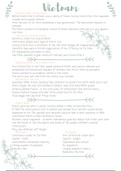- Week 1: proto-anthropology
Anthropology before anthropology
Historically, anthropology is a Western project
Is this s ll the case? And does it ma er?
Encounters with the other: expansion
- Herodotus:
Travel writer, historian
(5th century BCE)
- Marco Polo 1295-1324
Travel writer
Traveled on the Silk Road and lived in China
- Ibn Khaldun 1331-1405
Historian and forerunner of the social sciences
Study of North African socie es
Materialist argument
Theory of solidarity
Expansion of knowledge, territory, power > diverging interests
* Las Casas and the “Indian ques on” (and the start of the Transatlan c slave trade)
Montaigne > savage (sauvage) is seen as ‘natural’ human
Roman c period: fascina on with nature as a cultural cri que > culture seen as decadent
Jean-Jacques Rousseau:
The ‘noble savage’ as the opposite of degenerate civilized humans
The term ‘savage’ has been current in anthropology > posi ve connota on (e.g. Levi-Strauss: La pensée
sauvage) > legacy of Roman cism
Enlightment social theories
“Universal histories” or evolu onary schemes (18th century)
NB: social theories of evolu onism preceded biological theories (Darwin)!
Cultural evolu on: universal stages of development
e.g. savagery > barbarism > civiliza on (Ferguson)
- Ra onal thinking as the motor of change
Auguste Comte’s theory of stages:
Idealism: society’s essence is its belief system > change occurs through advances in reasoning
Popular among the bourgeoisie > bourgeoisie worldview and agenda for progress
The end of porto-anthropology, leading to the rst proper anthropological theory: evolu onism
- Evolu onism
Evolu o = unfolding of a scroll
- Charles Darwin, 1859: on the origin of species
-> Natural selec on, environmental adap on
-> Humans as integral part of the natural world
-> Biology as metaphor to think of society
- Herbert Spencer (1860-1900, social Darwinism)
ti ti titi ti ti ti tititi ti titt ti fi ti ti ti ti ti
, Tylor 1871: Primi ve Culture
First de ni on of culture:
“Culture or civiliza on, taken in its wide ethnographic sense, that complex whole which includes
knowledge, belief, art, morals, law, custom, and any other capabili es and habits acquired by (hu)man as a
member of society”
Evolu onist reasoning:
- History can be known if limited to (one) culture
- Looking for uniformity, rather than diversity
- Transi on between stages
Course of evolu on > uniform developments in society (‘laws’)
- Traceable through ‘cultural survivals’
- Cultural di erences indicate di erent stages in human evolu on
- From lower to higher stages of culture
E.g. religion:
Animism > polytheism > monotheism > deism
Morgan 1877: Ancient Society
Explana on of ‘ethical periods’
Savagery > barbarism > civiliza on
Areas (Primary ins tu ons):
Subsistence
Government
Language
Family
Religion
Domes c life
Property
Savagery
- Lower: speech
- Middle: re, shery
- Upper: bow and arrow
Barbarism
- Lower: po ery
- Middle: domes ca on of animals, cul va on of plants
- Upper: iron
Civiliza on > script and wri en records
- An quity
- Modernity
The heritage of evolu onism
> anthropology as a humanis c science > ‘the science of culture is a reformer’s science’ (Taylor)
> in uence on Marxism and other materialist theories
> common sense understanding of human development
- Week 2: mee ng 1: Modern Anthropology
08-11-22
‘Society is a system’ = the society is an integrated part?
Throughout 19th century:
- Evolu onism
- Studies done on basis of stories and travel books
tifl tititifitifi ttffti fiti titi tititi titi tt ti tiff ti ti ti ti
, - Armchair scien sts (Frazer - the Golden bough)
- Society followed a singular trajectory; di erences most o en based on biological traits (European society
as the more superieur one)
3 great thinkers who laid the founda on of sociology:
- Karl Marx
- Max Weber
- Emile Durkheim (developed theory basis 4 founding fathers of anthropology)
But:
- Focused on industrialized socie es
- Explaining industrializa on
Break late 19th century:
Inspired by:
- scien c developments
- Especially psychoanalysis
- And natural sciences (Einstein)
Created a greater need to embed anthropology scien cally
Four founding fathers:
- Boas
- Radcli e-brown
- Malinowski
- Mauss
Emile Durkheim
Structural func onalism
‘How can society live together harmonically’
Pre-modern/ ‘primi ve socie es’:
- Mechanical society
- Based on kinship
- Ritualized
- Sacralized
Modern socie es:
- Organic (each of these ins tu ons were like an organ)
- Industrialized
- Diverse
- Social ins tu ons / prac ces have a func on for the whole
Individuals have func ons to perpetuate society
1. Franz Boas
- Trained in physics, geography, philosophy
- Worked with Bas an (kulturkreise/ di usionism)
1881: Study of Inuit on Ba n island
1886: 3 months trip to Vancouver island > study of Kwakiutl
• One of the founders of the AAA; American Anthropological Associa on (1902)
• Curator at American Museum of Natural History
• Prof at Columbia university, NY
Major in uences:
tifi
ff flti tititi ti ti ti titi tiffi titi ti tiff ffti tifi ft ti
, 1. Empirically based on anthropology
2. Di usionism
3. Cultural di erences came forth from di usionism and not biological traits
4. Diachronic (explain a phenomenon throughout me) / synchronic (explain a phenomenon in the
context)
Historical par cularism (aka cultural history)
Discourses on “primi ve” humans
What is complexity?
“While some prac ces in speci c cultures may be organiza onally simple, other traits in the same culture
may be quite complex”
Diversi ca on of prac ces and roles
Cri que on evolu onism:
- Similar objets and customs ful ll di erent roles in di erent socie es and can therefore not be linked to an
unilinear evolu on
- Di cult to test assump ons
Cri que on di usionism
- Cultural contexts are unique
- But, then, how can we explain change?
- Accultura on - a processing of foreign elements following the pa ern in a the new cultural environment
(Boas added this to di usionism)
He had cri ques about di usionism but he added an element (accultura on) to it.
Historical par cularism: empirically based anthropology
Rigorous approach to ethnographic eldwork:
- Anthropologist must live with the people for a longer period of me
- Learn local language
- Observa on, par cipa on, listening
- Local knowledge!
Historical par cularism and theory
• No a empt to construct a grand theory of cultural development:
- “Un l we have been able to unravel the processes that have been going under our eyes”
• “Unique history” of each cultural group
• Holis c research > nding rela ons and pa erns
Re exivity of perspec ve
Categories of language make us see the world in par cular ways
Sapir-Whorf Hypothesis: our language in uences how we look at the world
The ‘urgent’ anthropology of Boas:
- Disappearing indigenous north American cultures > salvage ethnography > ethnological museums
- Accultura on processes con nue
- Cultural diversity is decreasing (because the indigenous people were slowly killed o )
The idea ‘we are di erent than them’ > present among all the founding fathers (at that me it was
embedded in their thinking)
Boas’ legacy :
- focus on descrip ve studies rather than a grand theory of culture > drawback: no systema c approach
- Public anthropology > raising awareness - entering the public debate
ffflti tttiti fi tititiff tiff titititififf titiff
ffi
tititi ff ti tififi fiff ff fl tt ti tiff ti tittti ti ff ti ti



